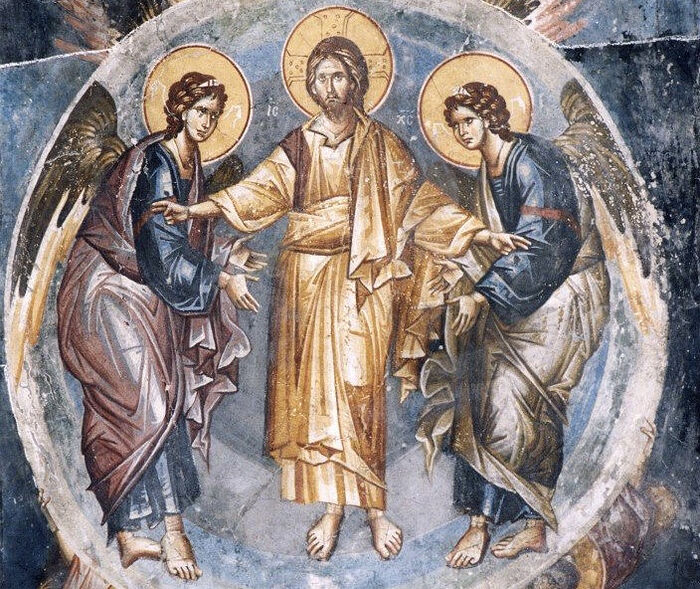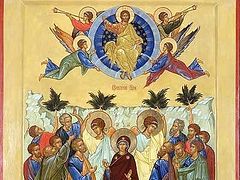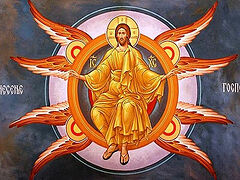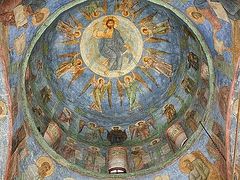A new project of the Spiritual-Educational Center of Sretensky Monastery on the study of Sacred Scripture, conducted by the well-known catechist Sergei Komarov, has begun. We will be discussing the book that begins the liturgical collection of the Apostolic epistles—the Acts of the Holy Apostles.
In this lecture, Sergei discusses the many meanings of the Ascension of the Lord, which we celebrate today.
We continue our talks on the book of Acts. I would like to return to some verses that we already went over last time. Let’s read again about the Ascension of the Lord, beginning with 1:6.
When they therefore were come together, they asked of Him, saying, Lord, wilt Thou at this time restore again the kingdom to Israel?
This brief conversation between the Disciples and Christ before His Ascension expresses a lot. Look: The Lord preached to the Apostles about the Kingdom of God for more than three years before His Resurrection, and another forty days afterwards, and they still didn’t understand the essence of the Gospel of Christ. And they didn’t understand until Pentecost.
Christ tells the Apostles about the Kingdom of God, but they’re waiting for an earthly kingdom, where Christ will be the political ruler of Israel. The Jews have exactly the same expectation to this day.
Man is characterized by such infirmity, after all! Until the Holy Spirit touches the heart, no matter how “correctly” the words of Christ are perceived, it will still be incorrect somehow. To understand spiritual things, you have to be touched by God.
Christ doesn’t tell them that they misunderstand the Kingdom of God, He doesn’t correct them. They wouldn’t have understood what He meant anyways. If Christ started explaining to them that the Kingdom of God is the internal connection with God, when God lives in the human heart, constant conversation with God, abiding with Him, the heart’s rest in Christ—they would have been even more confused.
When a man has no living experience of communion with God, he either understands nothing in such conversations, or misunderstands, as in Christ’s conversation with the Pharisee Nikodemos. Christ tells him about the spiritual life: The wind bloweth where it listeth, and thou hearest the sound thereof, and Nikodemos answers with perplexity: How can these things be? (Jn. 3:8-9).
The Apostles want Christ to “restore” the kingdom of Israel, that is, to make it as powerful again as in the time of Solomon. But Christ didn’t come to restore some earthly corporations. He came to give new life to mankind, languishing in sins. Christ is everything new. He’s the New Adam.
1:7 And He said unto them, It is not for you to know the times or the seasons, which the Father hath put in His own power.
“Times and seasons” is a quote from the book of the Prophet Daniel (2:21). “Times” is a specific historical moment. “Seasons” is a critical moment in history, and bears an eschatological meaning. This word was used to indicate the proximity of the end of the world.
According to Christ’s speech, “the times and seasons” really do exist. They were ordained by God.
But it’s impossible for man to know these things. Christ answered similar questions the same way in the Gospel: But of that day and that hour knoweth no man, no, not the angels which are in Heaven, neither the Son, but the Father (Mk. 13:32). Here, instead of “times and seasons,” “day and hour” are used with the same meaning.
It’s interesting that Christ expressed Himself as though He didn’t know the time of the end of the world, although we understand that He cannot but know everything. Why did the Lord say this? There are several interpretations of this point.
First: With this saying, the Lord wanted to show that it’s not that He didn’t know this mystery, but that the Father takes the lead in knowledge, communicating it to the Son (St. Irenaeus of Lyons, and others).
Second: Christ knew it as God, but didn’t know it as man. That is, Christ answers as a man, from His human nature (St. Basil the Great, and others). However, St. Gregory the Great observes: “The Savior knew the Day of Judgment even according to His human nature, but not by virtue of His human mind.”
Third interpretation: It’s not part of Christ’s mission to reveal the times and seasons. He knows everything but “doesn’t know” as if for us, for men. God the Father didn’t give Him such a command to tell us about it. Therefore, He says He “doesn’t know.” The Son’s ignorance of the day and hour of the Parousia1 should be understood not as ignorance, but as the educational tool of a wise teacher (St. Ephraim the Syrian, and others).
The fourth thought is expressed by St. Epiphanius of Cyprus: “The Father knows the day and hour and knows the Judgment itself by His activity, as He decided to execute it through the Son, but the Son, although He knows when the Judgment will occur, doesn’t know it in practice, as He doesn’t produce it.” We also find an interesting view in St. Gregory of Tours, that the son here doesn’t refer to the Lord, but to God’s adopted people (Israel).
By the way, the Orthodox understanding of the topic of predestination is based on this knowing God predestines because He knows in advance. God doesn’t force the will of man, doesn’t determine our life. He simply knows in advance, and therefore predestines.
Christ refused to talk about times and seasons. Let’s imagine what would have been had He talked about the time of the end of the world. One possibility: It won’t be soon, only after a thousand years. How would we react? We’d relax and live carelessly, in a bad sense. Another possibility: The end of the world is coming, for example, tomorrow. In this case, we’d fall into despair, we’d be afraid. Our repentance wouldn’t be real—it’d be some kind of psychological violence against ourselves.
Therefore, the Lord answers very wisely: Watch therefore: for ye know not what hour your Lord doth come (Mt. 24:42)—this stance is the most beneficial for the spiritual life. Christians wait for their Lord; they should always be in a state of some kind of spiritual tension—but without panic, with hope in God. Only He knows the “times and seasons.” Such knowledge wouldn’t be useful for us.
1:8 But ye shall receive power, after that the Holy Spirit is come upon you—meaning Pentecost—and ye shall be witnesses unto Me both in Jerusalem, and in all Judaea, and in Samaria, and unto the uttermost part of the earth.
The Disciples can’t and shouldn’t know about “times and seasons.” But what’s going to happen to them in the near future, Christ does reveal to them, so they might prepare and so their thoughts might be set in the right direction. The Apostles must become “witnesses” of Christ.
A Christian preacher, an apostle, and really all of us in general are witnesses of Christ. The Greek word, “μάρτυς (martis),” is translated as both “witness” and “martyr” at the same time. Martyrs are witnesses of the Kingdom of God, witnesses of Christ. Christ Himself is a witness of the Kingdom of God, of God the Father. He is the Messenger, the Apostle of God the Father (Christ is called “Apostle” in Heb. 3:1).
A Christian is a witness of Christ; that is, he knows Christ, he can talk about Him, he is familiar with Him. He’s a kind of “authorized,” trusted person, close to Christ. This closeness is from the Holy Spirit. Through the Holy Spirit, a Christian is united with Christ, and through Christ—with God the Father.
And ye shall be witnesses unto Me both in Jerusalem, and in all Judaea, and in Samaria, and unto the uttermost part of the earth. Here the Savior foretells the order in which the Gospel message will be spread: Jerusalem ???? Judea ???? Samaria ???? the ends of the earth (that is, the entire world). And that’s how it happened.
The time of the “restoration of Israel” is unknown. But the Israelites are destined for a mission at the end of time—to become anointed of the Spirit to bear witness to Christ. This mission is entrusted to them now. The Disciples of Christ are to act as the faithful remnant of Israel. When Israel fell away from God, the faithful remnant was always preserved. The Disciples of Christ should become such a prophetic and remnant faithful.
The motive of continuity is important in Holy Scripture. For example, Moses bequeathed the fulfillment of his mission to Joshua, the Son of Nun. Elijah blessed his successor Elisha to continue his prophetic ministry. Rabbis and philosophers passed on their teachings to followers for further development. And Christ, having ascended immediately after the commission, And ye shall be witnesses, entrusted the work of Gospel preaching to His disciples. We, Christians, are responsible for the work of spreading the Gospel throughout the entire world, until the Lord returns.
1:9-11 And when He had spoken these things, while they beheld, He was taken up; and a cloud received Him out of their sight. And while they looked stedfastly toward Heaven as He went up, behold, two men stood by them in white apparel; Which also said, Ye men of Galilee, why stand ye gazing up into Heaven? this same Jesus, Which is taken up from you into Heaven, shall so come in like manner as ye have seen Him go into Heaven.
Here we have the Ascension of the Lord before us—one of the Twelve Great Feasts. We remember this Gospel event every year because it has many meanings.
First: Christ paved the way to Heaven for us. He goes to prepare a place for us, as He Himself said: In My Father’s house are many mansions: if it were not so, I would have told you. I go to prepare a place for you (Jn. 14:2). In this sense, Christ is the Forerunner. We usually call St. John the Baptist the Forerunner, but the Bible doesn’t call him this. In the Bible, the title “forerunner” is used about Christ. In the Apostle Paul’s Epistle to the Hebrews, he calls Christ “πρόδρομος (prodromos)”—“forerunner:” Whither the forerunner is for us entered, even Jesus, made an high priest for ever after the order of Melchisedec (Heb. 6:20).
St. Paul says that Christ ascended to Heaven with His blood to the Heavenly tabernacle, and offered this blood to God the Father. The Ascension has a redemptive character. This feast also has eschatological significance (eschatology is the theological study of the ultimate fate of the world).
This same Jesus, Which is taken up from you into Heaven, shall so come in like manner as ye have seen Him go into Heaven. As He ascended on a cloud, so He will return on a cloud. Behold, He cometh with clouds (Rev. 1:7), says the book of Revelation. Interestingly, the Apostle Paul calls the host of saints a cloud of witnesses (Heb. 12:1). It’s appropriate to assume that Christ will come to judge the world together with the saints, with a “cloud of witnesses.”
The feast of Ascension also has a soteriological (the theological teaching about man) meaning. The Ascension is the glorification of human nature in the Kingdom of the Most Holy Trinity.
Christ already glorified human nature by His Resurrection. What’s particular about the Ascension in the history of our salvation? To begin with, let’s understand what the Resurrection of Christ gives us, and then we’ll talk about the Ascension.
In the Resurrection, the Lord acquires two things for human nature:
-
The blameless passions, to use the terminology of St. Maximus the Confessor, leave His human nature. What are they?
Here’s the classical definition from St. John of Damascus:
For the natural and innocent passions are those which are not in our power, but which have entered into the life of man owing to the condemnation by reason of the transgression; such as hunger, thirst, weariness, labour, the tears, the corruption, the shrinking from death, the fear, the agony with the bloody sweat, the succour at the hands of angels because of the weakness of the nature, and other such like passions which belong by nature to every man (An Exact Exposition of the Orthodox Faith 3.20).
After the Resurrection, Christ no longer needs to eat and drink, although He can eat and drink after His Resurrection. But He doesn’t get hungry, doesn’t get tired. His body acquires special properties—He passes through walls and can appear in various places in various forms.
-
After the Resurrection, Christ can no longer die.
The Apostle Paul writes: Knowing that Christ being raised from the dead dieth no more; death hath no more dominion over Him (Rom. 6:9). Before His death and Resurrection, He was mortal, that is, He could die. Although the Fathers say that Christ could die during His earthly life only if He wanted to—and He died for us, because He wanted to. Had He not wanted to, He could have not died, because He’s the God-Man. But He wanted to die for us, and this was His feat for us.
Thus, Christ acquires two things for human nature, in and of Himself, after His Resurrection. First: incorruption. In theology, “incorruption” is a term used in relation to various things. For example, man’s ability to suffer and get sick, or the decomposition of the body into elements after death—this is also corruption. And Christ’s second gift to our nature: immortality.
We unite ourselves with the renewal of human nature in Christ in the Church through the Sacraments. The Church is the Body of Christ. In the Church, we appropriate for ourselves the fruits of Christ’s redemptive work by the Holy Spirit. That’s how God arranged it. Therefore, outside the Church, there is no salvation. Christ saves the Church—His Body, the New Israel, the people of God. It’s precisely in the Church that we are united to the new, deified, healed human nature in Christ.
Otherwise, it’s impossible to heal our nature of sin. You won’t be able to change your nature. It must be done by Divine grace, the grace of the Church, which is given through the Sacraments. Christ deified human nature in the Resurrection.
So what’s the meaning of the Ascension? Christ returns to where He originally was—to God the Father. The Ascension is a confirmation of the Divine status of the resurrected Jesus. Also, by the Ascension, Christ introduces human nature into the life of the Most Holy Trinity. The meaning of the Ascension is the glorification of human nature. St. Gregory Palamas says that if the Resurrection is the feast of all people, because everyone will be resurrected, then the Ascension is a feast only of the saints—Christians—because only Christians will be with God.
Two men … in white apparel speak with the Apostles. These are angels, of course. Their white clothes are a sign of purity, of holiness.









